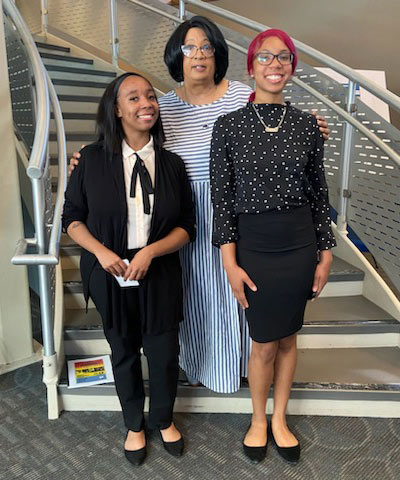Advancing Interest in Research Among BIPOC Students
Collaborative Training Program
April 17, 2023Brianna Clifford, a junior psychology major at Lincoln University, plans to attend
graduate school to focus on counseling psychology. That was definitely the plan before she participated in a training program to increase
the number of researchers who are Black, indigenous and people of color (BIPOC).
“I might have to change that a little bit,” Clifford said of her future. “This was
my first experience in research, and I find it really interesting.”
That’s exactly the goal of the nine-month program, developed and implemented by Philadelphia College of Osteopathic Medicine and Public Health Management Corporation in collaboration with Lincoln University.
Through the program, Lincoln undergraduates receive training in research methodology,
psychology, and addiction science through seminars, experiential activities, and a
mentored research project culminating in a poster and oral presentation.
Preliminary outcomes from the first three program cohorts (a total of six students)
were recently published in the academic journal BMC Medical Education to raise awareness about the institutional research collaboration, as “the necessity
of welcoming and preparing BIPOC students into healthcare, health policy, clinical
research, and behavioral science fields remains an urgent priority,” according to the article.
The collaboration was co-led by Michelle R. Lent, PhD, an associate professor in the School of Professional and Applied Psychology at PCOM,
and Diana Harris, PhD, MBe, a health equity consultant at Public Health Management
Corporation (PHMC). In 2019, the researchers, led by Karen Dugosh, PhD, senior research
scientist and director of the Research and Evaluation Group at PHMC, received funding
from the Pennsylvania Department of Health to conduct a randomized clinical trial
examining how to best provide psychosocial services to individuals taking buprenorphine
for opioid use disorder. In addition to funding the clinical trial, the project assembled
the multidisciplinary team of investigators across the partner institutions and established
the student-training program.
Among the primary project aims is leveraging the research activities within the trial
to help train select undergraduate psychology students from Lincoln who are interested
in exploring a career in addictions or psychology research. Two students rotate through
the program each academic year, with primary objectives to enhance interest in and
understanding of clinical research; expand students’ knowledge of substance use disorders
and treatment; recognize historical, cultural and ethical considerations and their
impact on marginalized communities in clinical research and treatment; and advance
student development for graduate-level study or “practitioner-scholar” career fields.
Clifford and Janel Nelson, also a junior psychology major at Lincoln, are the program’s
fourth and final cohort. They participate in weekly seminars on foundational research
and ethical concepts, as well as shadowing opportunities such as watching informed
consent processes and meeting with study interventionists, including behavioral health
counselors and peer-support specialists. Their independent projects ask and answer
their own research questions using data from the clinical trial. Participation involves
a commitment of up to 20 hours per month and includes annual stipends for each student.
According to the research team’s journal article, the shadowing experiences most frequently
ranked as students’ favorite element of the program.
Nelson said she hadn’t conducted research before but was eager to apply what she’s
learning in textbooks and in class—like tests and equations—to research with people.
“It’s my first time stepping out of the textbook and applying it to real life,” she
said. Likewise, Clifford said it is “fundamental to apply what you’re learning in
class to real life.”
“It’s really that aha moment,” Clifford said. “It’s all about making connections.
You can go to school and get a degree, but if you don’t know anyone, it can be harder
to figure out where you want to go or what you want to do. … I’ll have these connections
even after the program is over. Everyone needs a support system and people who can
point them in the right direction.”
To Lent, the program is an opportunity to intervene and address a broken pipeline
for research careers. “I hope that these are relationships that will continue throughout
their lives, whether in research, graduate study, or other careers,” she said.
To Harris, the students’ experiences and feedback are reflected “in a way we intended
to provide the training and mentorship and grow the collaboration in the first place.”
“From a pedagogical perspective, our research team’s skillsets are complementary,
and these inclusive experiences that are multidisciplinary help connect the theoretical
to the real world,” Harris said.
What the students gave back to the research team, Harris added, “is rigor, practice,
receptiveness and curiosity.”
About Philadelphia College of Osteopathic Medicine
Established in 1899, Philadelphia College of Osteopathic Medicine (PCOM) has trained
thousands of highly competent, caring physicians, health practitioners and behavioral
scientists who practice a “whole person” approach to care—treating people, not just
symptoms. PCOM, a private, not-for-profit accredited institution of higher education,
operates three campuses (PCOM, PCOM Georgia and PCOM South Georgia) and offers doctoral degrees in clinical psychology, educational psychology, osteopathic
medicine, pharmacy, physical therapy, and school psychology. The college also offers
graduate degrees in applied behavior analysis, applied positive psychology, biomedical
sciences, forensic medicine, medical laboratory science, mental health counseling,
physician assistant studies, and school psychology. PCOM students learn the importance
of health promotion, research, education and service to the community. Through its
community-based Healthcare Centers, PCOM provides care to medically underserved populations.
For more information, visit pcom.edu or call 215-871-6100.
Contact Us
For general media inquiries, please contact the Office of Marketing and Communications
at 215-871-6300 or communications@pcom.edu. Visit our media relations page to view contact information for public relations personnel.
Connect with PCOM

 Brianna Clifford, a junior psychology major at Lincoln University, plans to attend
graduate school to focus on
Brianna Clifford, a junior psychology major at Lincoln University, plans to attend
graduate school to focus on 